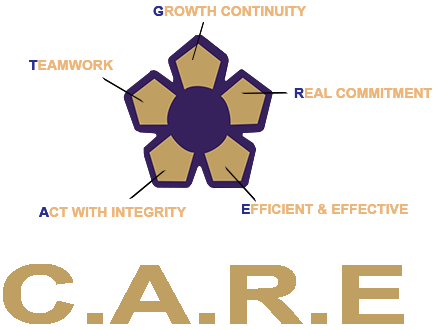Golden Land Berhad (“GLBHD”) currently possesses location permits land bank of approximately 73,205 hectares and are in the process of acquiring the rights to cultivate (Hak Guna Usaha) status for the total arable land. GLBHD aims to plant 13,000 hectares by 2023 and 18,000 hectares by 2024 in East and South Kalimantan.
GLBHD is committed to being a sustainable palm oil producer in compliance with sustainability standards for agricultural production. Once the oil palm estates are established, GLBHD ’s subsidiaries in Indonesia will start the process of obtaining the Indonesia Sustainable Palm Oil (“ISPO”) certification. It is expected all of the plantation to be ISPO certified in the near future. Several measures such as No Open Burning Policy and the Sustainability Policy have been put in place in our plantation Standard Operating Procedures (“SOP”) in line with the ISPO guidelines.
GLBHD strictly enforces and monitors, at every planting phase, the use of quality planting methods so as to ensure sustainable yields. This includes careful selection of planting materials, stringent culling, good nursery upkeep and adopting good field planting practices. GLBHD aims to achieve optimum productivity and cost-efficient palm oil producer.
GIVINIG BACK TO THE COMMUNITY
GLBHD is dedicated towards efforts of preserving the biodiversity and ecological harmony of the lands they operate, besides creating employment opportunities to develop the local economy for indigenous communities.
The Inti-Plasma Partnership Programme is a Corporate Social Responsibility (“CSR”) initiative which allows locals to develop a percentage of the plantation land subsequently rewarding them with their share of profits accordingly.
The Inti-Plasma Partnership Programme ensures that a fair percentage of the plantation proceeds is channelled towards developing a sustainable economy for the local community.
HR & QUALITY COMPLIANCE
GLBHD believes that quality human resource management is the pivotal part of the plantation business. Initiatives such as Advisory, Training and Audit Services was established to ensure all aspects of plantation operation are in compliance with SOP, bridging the competency gaps of the plantation management team and promoting good agricultural practices.
The Risk Mitigation & Compliance Monitoring Framework (“RMCM”) was established to determine GLBHD ’s level of risk tolerance and actively identify, assess and monitor key business risks.
With the RMCM, the senior management, operational managers and employees are better equipped to understand and effectively manage risks. This ensures that all employees are aware of the importance of compliance with company policies and prevailing laws and regulations.
Growth Continuity
- We will strive with out utmost effort and initiative for a sustainable and consistent progress through consistent maximizing the utilization of resources
- We will strive to develop our people’s competency capability and knowledge to attain corporate goal.
Real Commitment
- We will be accountable & responsible for all activities performed
- We will give our best to achieve the best
Efficient & Effective
- We will strive to continuously improve what we are doing to accomplish our mission
- We will provide the best result in a timely manner
Act with Intergrity
- We will conduct ourselves professionally & ethically with sincerity, honesty & discipline
Teamwork
- We will act with positive attitudes towards each other to create togetherness
- We will achieve team synergy respect, trust, care for each other and focus our energy to accomplish our common goals

Reach us
Add Review
Your email address will not be published.

.jpg)
